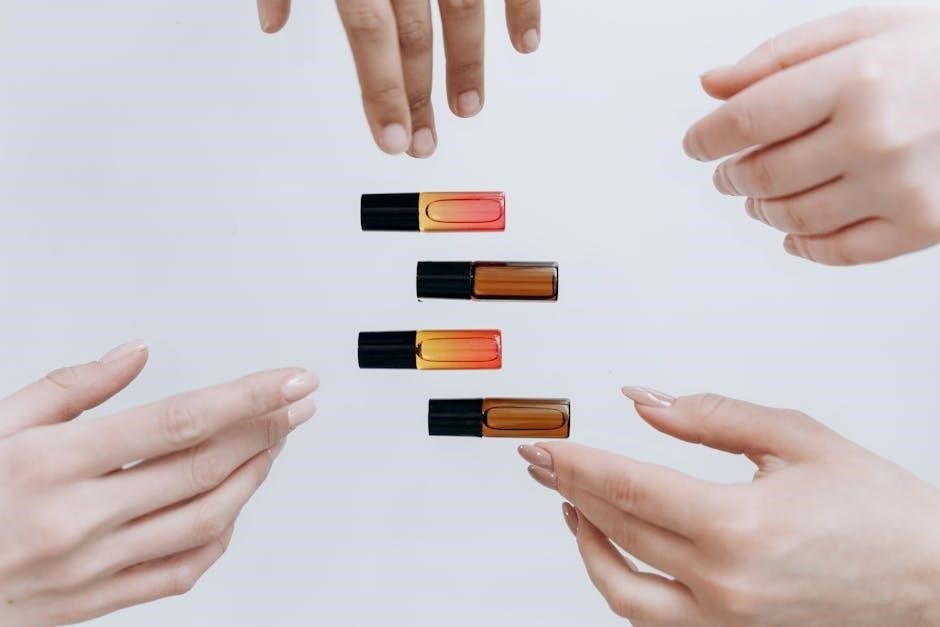list of tinctures and uses pdf
Tinctures are concentrated herbal extracts offering natural health solutions. Portable, customizable, and versatile, they provide potent benefits for various wellness needs, making them a popular choice for holistic care.
What Are Tinctures?
Tinctures are concentrated liquid extracts made by steeping herbs, plants, or mushrooms in a solvent, typically alcohol, vinegar, or glycerin. This process captures the active compounds, creating a potent remedy.
A Brief History of Tinctures
Tinctures have been used for centuries, with roots in ancient medicine. Early civilizations like Egypt and China employed herbal extracts for health. During the Middle Ages, monasteries preserved herbal knowledge, creating tinctures for healing. These concentrated remedies became popular in traditional medicine, offering a potent way to deliver herbal benefits. Over time, tinctures evolved, incorporating various solvents and methods. Today, they remain a cornerstone of natural health, valued for their portability and effectiveness. Their rich history reflects a blend of ancient wisdom and modern adaptation, making them a timeless tool for wellness.
Advantages of Using Tinctures
Tinctures offer numerous advantages, making them a preferred choice for many. They are highly concentrated, ensuring potent doses in small amounts. Easy to consume, they can be taken sublingually or mixed with water. Their long shelf life and portability make them convenient for daily use. Tinctures also allow for customization, enabling users to tailor blends for specific needs. Additionally, they bypass digestion, ensuring rapid absorption and effectiveness. Their versatility in application, whether for internal or topical use, further enhances their utility. Overall, tinctures provide a practical and efficient way to harness the benefits of herbs for health and wellness.

How to Make Herbal Tinctures
Herbal tinctures are made by steeping herbs in alcohol, vinegar, or glycerin for 2-6 weeks. The mixture is strained, and the liquid is stored for later use.
Methods of Tincture Preparation
Tinctures are typically made by steeping herbs in alcohol, vinegar, or glycerin for 2-6 weeks. The maceration method involves soaking herbs in a solvent, while percolation uses gravity to extract compounds. For convenience, powders can also be used to make tinctures. The cold infusion method is ideal for delicate herbs, while hot extraction speeds up the process for tougher plant material. Each method ensures the extraction of therapeutic compounds, offering flexibility for different herbal materials and desired outcomes. Proper storage in dark glass bottles preserves potency, ensuring tinctures remain effective for up to two years.
Using Alcohol, Vinegar, or Glycerin as Solvents
Alcohol, vinegar, and glycerin are common solvents for tinctures, each with unique benefits. Alcohol is the most effective at extracting herbal compounds, making it the preferred choice for potency. Vinegar is a better option for children or those avoiding alcohol, though it’s less potent. Glycerin, a sweet, non-toxic solvent, is ideal for delicate herbs and creating alcohol-free remedies. When using alcohol, a 1:2 or 1:3 herb-to-solvent ratio is typical. Vinegar tinctures are made similarly but are less shelf-stable. Glycerin tinctures are gentler and often used for children or sensitive individuals. Each solvent offers flexibility, allowing users to tailor tinctures to their health needs and preferences.
Tips for Making Medicinal Mushroom Tinctures
For medicinal mushroom tinctures, dried mushrooms are often preferred over fresh due to their concentrated properties. A dual extraction method, combining alcohol and hot water, enhances bioavailability. Start with a 1:5 mushroom-to-solvent ratio for optimal potency. Steep the mixture for 4-6 weeks, shaking daily to ensure even extraction. After straining, store the tincture in a cool, dark place. For dosing, 1/4 to 1/2 teaspoon is typical. To avoid contamination, use clean equipment and avoid touching the mushrooms excessively. Experiment with species like Reishi, Chaga, or Lion’s Mane for diverse health benefits. Always consult a healthcare professional before use, especially for chronic conditions or interactions with medications.
Using Herb Powders for Tinctures
Herb powders can be effectively used for tinctures, offering convenience and consistency. Powders have a larger surface area, allowing for faster extraction. Start with a 1:5 powder-to-solvent ratio, using alcohol or glycerin. Combine in a clean glass jar, shake daily for 2-4 weeks, and strain. Powders often extract more efficiently than whole herbs. For medicinal mushrooms, powders are preferred for their potency. Store the tincture in a dark bottle. Dosage typically ranges from 20-30 drops. Ensure powders are finely ground for optimal extraction. This method is ideal for those who prefer a streamlined process without the bulk of whole herbs.

Benefits of Using Tinctures
Tinctures offer versatility, easy absorption, and long shelf life. They provide concentrated health benefits, supporting immune function, mood, and digestion. Perfect for personalized wellness and convenient use.
Health Benefits of Herbal Tinctures
Herbal tinctures offer a wide range of health benefits, from boosting the immune system to supporting mental well-being. Echinacea tinctures enhance immunity, while St. John’s Wort helps alleviate mild depression. Milk Thistle supports liver health, and Valerian root promotes relaxation for better sleep. Turmeric and Ginger tinctures reduce inflammation and aid digestion, respectively. Peppermint tinctures soothe digestive issues, and Chamomile calms the mind for relaxation. Elderberry tinctures are renowned for fighting cold and flu symptoms. These concentrated extracts deliver potent, natural solutions for various health concerns, making them a popular choice for holistic wellness. Always consult a healthcare professional before use, especially for chronic conditions or interactions with medications.
Convenience of Tinctures for Health and Wellness
Tinctures are a highly convenient option for health and wellness due to their ease of use and portability. They can be taken sublingually or mixed with water, making them simple to incorporate into daily routines. Their concentrated form ensures a small amount delivers potent benefits, and they have a long shelf life when stored properly; Tinctures are also versatile, allowing users to combine different herbs for personalized health solutions. This adaptability and ease of administration make them a practical choice for those seeking natural remedies without the hassle of complex preparations or short expiration periods.
Customization Options with Tinctures
Tinctures offer remarkable customization options, allowing users to tailor their health solutions to specific needs. By blending different herbal extracts, individuals can create personalized formulas for targeted benefits. This flexibility enables users to address multiple health concerns simultaneously, such as combining herbs for immune support and mood enhancement. Additionally, tinctures can be adjusted in potency and dosage, making them suitable for various health goals and preferences. This adaptability ensures that users can craft unique remedies that align with their wellness objectives, providing a personalized approach to natural health care; Customization also extends to the choice of solvents, such as alcohol, vinegar, or glycerin, catering to individual preferences and dietary restrictions.

List of Common Tinctures and Their Uses
Discover a variety of tinctures like Echinacea for immunity, Calendula for skin health, St. John’s Wort for mood, Milk Thistle for liver support, and Valerian Root for sleep.
Echinacea Tincture for Immune Support
Echinacea tincture, derived from the Echinacea plant, is renowned for its immune-boosting properties. It helps strengthen the body’s natural defenses, reducing the severity and duration of colds and flu. Rich in antioxidants and anti-inflammatory compounds, this tincture supports overall wellness and resilience. Many users find it effective for preventing illness during peak seasonal periods. Typically, 20-30 drops are recommended 2-3 times daily. Consult a healthcare professional before use, especially if pregnant or on medications. A natural and holistic approach to immune health, Echinacea tincture is a popular choice for those seeking alternative remedies;
Calendula Tincture for Skin Health
Calendula tincture, made from the flowers of the Calendula officinalis plant, is a natural remedy for skin health. Known for its anti-inflammatory, antimicrobial, and wound-healing properties, it is often used to treat burns, cuts, eczema, and acne. The tincture can be applied topically to soothe irritated skin, reduce redness, and promote tissue repair. It is also valued for its ability to prevent infection in minor wounds. Some users also take it internally to support skin health from within. With its gentle yet effective action, Calendula tincture is a popular choice for maintaining healthy, radiant skin and addressing various dermatological concerns naturally.
St. John’s Wort Tincture for Mood Support
St. John’s Wort tincture, derived from the flowers and leaves of Hypericum perforatum, is widely used to support mental well-being and alleviate mild depression and anxiety. Its active compound, hyperforin, interacts with neurotransmitters to enhance mood stability. Many people find it helpful for seasonal affective disorder and stress-related fatigue. The tincture is typically taken sublingually or added to water, with recommended doses varying based on individual needs. While it is a natural remedy, it can interact with certain medications, so consulting a healthcare provider is advised. St. John’s Wort tincture offers a holistic approach to emotional balance, making it a popular choice for those seeking alternative mood support solutions.
Milk Thistle Tincture for Liver Health
Milk thistle tincture, made from the seeds of the Silybum marianum plant, is renowned for its liver-supporting properties. The active compound, silymarin, is known to protect liver cells from damage and promote detoxification. Historically used in traditional medicine, this tincture aids in liver regeneration and reduces oxidative stress. It is often recommended for individuals exposed to toxins, alcohol, or certain medications. Additionally, milk thistle tincture is valued for its antioxidant properties, which contribute to overall liver health. Many herbalists suggest it for supporting recovery from liver-related conditions. This natural remedy is a popular choice for those seeking a holistic approach to maintaining liver function and well-being.
Valerian Root Tincture for Sleep Aid
Valerian root tincture is a natural remedy for addressing sleep disorders and promoting relaxation. Derived from the Valeriana officinalis plant, it contains compounds like valerenic acid, which interact with the brain to reduce stress and anxiety. This tincture is often used to treat insomnia, restlessness, and difficulty falling asleep. It is valued for its calming effects without causing drowsiness the next day. The recommended dosage varies, but it is typically taken sublingually or mixed with water before bedtime. Valerian root tincture is also known to improve sleep quality and duration, making it a popular choice for those seeking a non-addictive sleep solution. Its mild, earthy flavor makes it easy to incorporate into daily routines for better rest and recovery.
Ginger Tincture for Digestive Issues
Ginger tincture is a potent remedy for alleviating digestive discomfort. Known for its anti-inflammatory and anti-nausea properties, it effectively eases symptoms like bloating, indigestion, and motion sickness. Ginger’s active compounds, such as gingerol, stimulate digestion and soothe the stomach lining. This tincture is particularly beneficial for those experiencing persistent gastrointestinal issues. It can be taken sublingually or added to water, typically in small doses of 10-20 drops before meals. Ginger tincture is also valued for its ability to reduce inflammation and support overall gut health. Its natural, warming properties make it a popular choice for promoting digestive balance and relieving discomfort without harsh side effects.

Turmeric Tincture for Inflammation
Turmeric tincture is a powerful natural remedy for reducing inflammation and alleviating pain. Its active compound, curcumin, has potent anti-inflammatory and antioxidant properties, making it effective for conditions like arthritis, joint pain, and muscle soreness. The tincture is typically made by steeping turmeric root in alcohol or glycerin, enhancing bioavailability. It supports immune function and can aid in digestive health; Many users find it helpful for chronic inflammation and post-exercise recovery. Dosage varies, but 10-20 drops daily is common. Turmeric tincture is also known for its ability to improve cognitive function and overall well-being. Always consult a healthcare professional before use, especially if combining with medications.
Peppermint Tincture for Digestive Relief
Peppermint tincture is a highly effective natural remedy for digestive issues, offering quick relief from bloating, indigestion, and irritable bowel syndrome (IBS). Its active compounds, menthol, and menthone, soothe the stomach lining, reducing inflammation and muscle spasms. Many users find it particularly helpful for calming nausea and cramps. The tincture is easy to administer, with typical dosages ranging from 10 to 30 drops in water. Peppermint’s cooling properties also make it a popular choice for post-meal digestion. Regular use can improve gut health and reduce symptoms of digestive discomfort. As with any herbal remedy, consult a healthcare professional before use, especially if you have sensitive stomach conditions or allergies to mint.
Chamomile Tincture for Relaxation
Chamomile tincture is a natural remedy renowned for its calming effects, making it an excellent choice for relaxation and stress relief. Rich in apigenin, a compound that binds to GABA receptors, it promotes a soothing effect on the nervous system. Many users find it helpful for alleviating anxiety, insomnia, and restlessness. The tincture is often consumed in doses of 20-30 drops before bed or during stressful moments. Its gentle, non-habit-forming properties make it suitable for long-term use. Additionally, chamomile’s anti-inflammatory traits may support skin health and digestive comfort. Always consult a healthcare provider before using, especially if pregnant or on medication, to ensure safe and effective use.
Elderberry Tincture for Cold and Flu
Elderberry tincture is a popular natural remedy for cold and flu symptoms, known for its antiviral properties. Derived from elderberries, it is rich in anthocyanins, powerful antioxidants that help combat viral infections. Many users find it effective in reducing the severity and duration of cold and flu symptoms, such as fever, congestion, and sore throats. The recommended dosage is typically 20-30 drops several times a day, diluted in water. Elderberry tincture is also valued for its immune-boosting effects, making it a great preventative measure during flu season. However, it is important to consult a healthcare professional before use, especially for those with pre-existing conditions or taking medications, to ensure safe and appropriate application.

Safety and Precautions
Always consult a healthcare professional before using tinctures, especially if pregnant, breastfeeding, or on medications. Start with small doses to check for allergies or adverse reactions. Proper storage and handling are essential to maintain potency and safety. Keep tinctures out of reach of children and pets to avoid accidental ingestion. Follow recommended dosages to minimize risks and maximize benefits. Quality sourcing and proper preparation are crucial for safe and effective use of herbal tinctures.
Important Safety Considerations
When using tinctures, prioritize safety by consulting a healthcare professional, especially if pregnant, breastfeeding, or on medications. Start with small doses to check for allergic reactions or sensitivity. Store tinctures in a cool, dark place, out of reach of children and pets. Be aware of potential interactions with other medications or health conditions. Avoid exceeding recommended dosages to prevent adverse effects. For individuals with alcohol sensitivities, consider non-alcohol based options like glycerin or vinegar tinctures. Ensure products are sourced from reputable manufacturers to guarantee quality and potency. Proper preparation and handling are crucial for safe and effective use of herbal tinctures.
Recommended Dosage Guidelines
Typically, tinctures are taken in small amounts due to their potency. Start with 10-20 drops for adults and 5-10 drops for children, adjusting based on individual needs and sensitivity. Dosage may vary depending on the herb’s strength and intended use. For acute conditions, doses can be taken every 2-4 hours, while chronic issues may require once or twice daily. Always consult the product label or a healthcare professional for specific guidance. Tinctures can be administered sublingually (under the tongue) or mixed with water for easier consumption. Avoid exceeding recommended amounts to prevent potential side effects. Consistency is key for optimal therapeutic benefits.
Precautions for Special Populations
Special populations, such as pregnant women, children, and individuals with chronic health conditions, should exercise caution when using tinctures. Pregnant or breastfeeding women should consult a healthcare provider before use, as some herbs may affect fetal development or milk production. Children require lower doses due to their sensitivity. People with liver or kidney disease should avoid certain tinctures, especially those with alcohol, which can exacerbate health issues. Additionally, individuals with a history of alcohol addiction should opt for non-alcoholic solvents like glycerin. Always prioritize medical advice to ensure safe and effective use of tinctures, particularly for vulnerable groups. This ensures personalized and responsible application of herbal remedies.

Sourcing and Quality
Source high-quality tinctures from reputable manufacturers using organic herbs. Ensure products are free of contaminants by checking for third-party testing and certifications, guaranteeing safety and potency.
Where to Source High-Quality Tinctures
To ensure you’re getting high-quality tinctures, look for reputable manufacturers that use organic, sustainably sourced herbs. Check for third-party testing and certifications like USDA Organic or GMP-compliant facilities. These ensure the product is free of contaminants and adheres to quality standards. Avoid brands with synthetic additives or unclear labeling. Transparency about sourcing, potency, and ingredients is crucial. You can find reliable tinctures at herbal apothecaries, health food stores, or trusted online retailers. Always verify the product’s expiration date and storage instructions to maintain its effectiveness. By choosing carefully, you can trust the tinctures to support your health and wellness safely and effectively.

How to Ensure Tincture Quality
Ensuring tincture quality involves verifying the source and production methods. Look for products made from organic, non-GMO herbs and check for third-party lab testing. Certifications like USDA Organic or GMP-compliant indicate adherence to high standards. Read labels carefully to avoid synthetic additives or artificial preservatives. Potency and bioavailability are crucial, so ensure the product specifies the concentration of active compounds. Reputable brands provide clear instructions for use and storage. Avoid products past their expiration date, as potency may degrade. Proper storage in a cool, dark place maintains effectiveness. By prioritizing transparency and quality control, you can trust your tinctures are safe and effective for your health needs.

Quick Reference Guide
This guide provides a concise overview of tinctures, their uses, and dosage tips, helping you navigate herbal remedies efficiently for various health and wellness purposes.
Herbal Tincture Quick Reference Sheet

A quick reference sheet organizes herbal tinctures by name, use, and dosage. It simplifies access to information, ensuring safe and effective use of herbal remedies; Many users maintain personal sheets to track their tincture collection, dosage preferences, and health benefits experienced. This tool is essential for managing multiple remedies and combining them for specific health needs; By categorizing tinctures, users can quickly identify which ones suit their conditions, making holistic health management more efficient and personalized. Whether for immune support, relaxation, or digestion, a well-organized reference sheet enhances the versatility of herbal tinctures in daily wellness routines.
